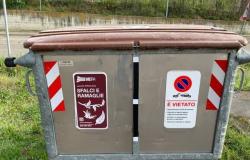
It was one of the sold out events at the Book Fair, with an audience of only twenty-year-olds despite a plot that in theory should involve parents over forty: All alive (Mondadori) by Valerio Millefoglie was presented yesterday evening in Matera in the TAM garden, inevitably dragging the public into a complex story narrated with extreme delicacy.
The novel-reportage begins with a terrible news story: on the night between 10 and 11 January 2022 Elisa Bricchi, Domenico Di Canio, Costantino Merli and William Pagani, four friends between the ages of twenty and twenty-three, capsize with the car in the Trebbia river, in the Piacenza area, and drowned.
The guys are part of a rap and trap music collective. When the parents find the songs on the computer of William, the music producer, they decide to inherit their children’s music but also their friendship and, in the case of Costantino and Elisa, their love. They founded a record label, released three albums, organized concerts to make them heard and put their voices into circulation.
Music is the common thread that allows Millefoglie to get to know these kids, indirectly. The analysis of texts, videos and interviews with parents, carried out thanks to a highly empathetic relationship that the author manages to weave with them, allows the children to be given new life in the pages. His was a full immersion – he visited the key places that characterized their days, entered their homes, spoke at length with their loved ones – and what emerged was an authentic portrait of everyday life up until that tragic watershed, the accident. What they were like, what they did, the relationship with their parents and, at the same time, how to deal with bereavement – after losing a child, a boyfriend, a friend.
In the city of the Sassi, alongside the Author, there is also the anthropologist Elena Dellù in a dialogue around the sounds, the finds, what remains of us after us.
All alive It is a very emotionally strong book. You went there, you listened to the boys’ families so you too were emotionally involved. How did it go?
“The involvement, I don’t know if emotional, but also physical, was necessary. I asked a lot of all of them, of their families. I asked that what happened that night somehow continue to be present because it required memory. My arrival in Piacenza was always a return to history, even if in the book I start from the news story, from the accident: it was a going back in time, recomposing their lives, their stories and above all their writing, their voices , their music. Mine was a necessary involvement because I had to forcefully, necessarily, speak out, given that I was asking so much of them.
At first, the idea was to follow this story for a year. The driving force is in the music that is found on the computer and that parents inherit by releasing the record. After a year, I was so into it that I continued to return to Piacenza once a month for another year. I was also interested in telling why this story had grabbed me so much, why I was magnetically pulled towards it. What was wrong with me, why did I go back to that story? There is this story in the book.”
Were there any family members of the boys who had any resistance to telling their story?
“At first I went there to do a report for Repubblica’s Friday. The news was not in the accident of four twenty-year-olds but in the singularity of the voices of these songs found by the parents who even decide to found a record label. There was a part of them that wanted to spread the news, almost as if to say: “My children didn’t succeed because they didn’t have time and now we’re making them famous.” And there were other parents who said: “But what does this stranger want from us?”.
The very first day I went there to meet one of the four families, I was told exactly this, before I met Elisa’s mother. The father told me: “It’s not the right day”. As if to say: “Don’t ask questions about the accident”. Then I told them why I liked those songs, I asked them to tell me about their children in writing, in life not in death. Afterwards, a bond was created. I took a trip with one of the families, originally from Ginosa, of a boy, Domenico, I took a trip from Piacenza from Borgonovo Val Tidone to Ginosa, at night. I tell it in one of the last chapters.”
The book came out in January. What feedback have you had so far?
At the Book Fair I was struck by the audience of twenty-year-olds. I said to myself: “Maybe this is a book that speaks more to mothers and fathers, but instead I changed my mind. I’m often involving rappers, creating connections and I’m also meeting parents with similar situations. I met a woman who lost a son in an accident, the boy wrote music with his twin brother who remained alive.”
Valerio Millefoglie is currently working on the podcast series “Sei Città”, promoted by BPER Banca and Fondazione Gruppo Abele and created in collaboration with Storielibere. The series is one of the numerous activities that make up Present4Future, the social inclusion project dedicated to boys and girls, Italian and foreign, between 14 and 24 years old. Conceived and implemented by BPER together with the Gruppo Abele Foundation, the program intends to support the growth of adolescents and young people from disadvantaged neighborhoods in six Italian cities (Rome, Milan, Naples, Turin, Palermo and Genoa), accompanying them to act in the present and build a better future.
Rossella Montemurro






